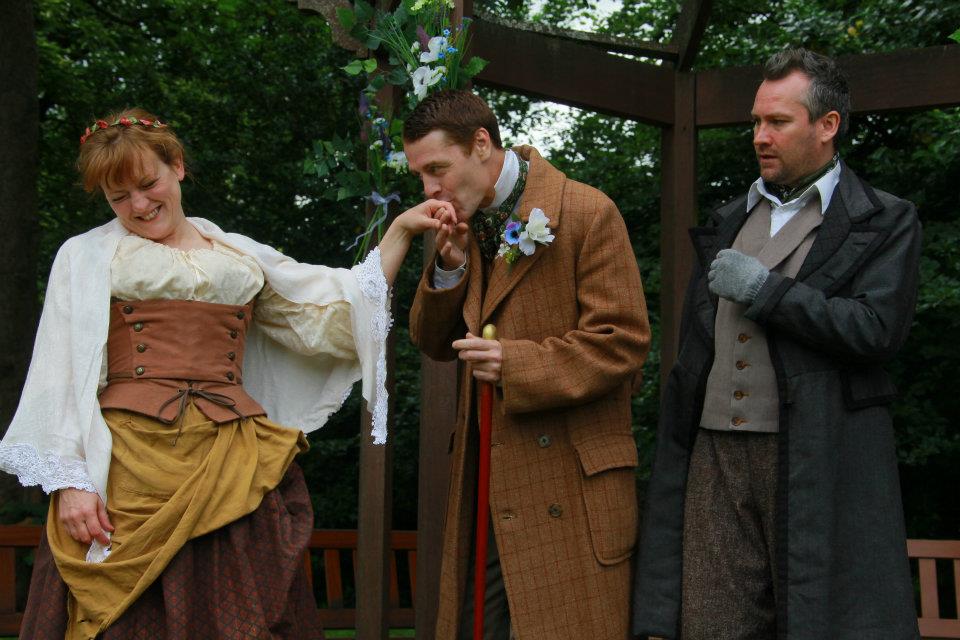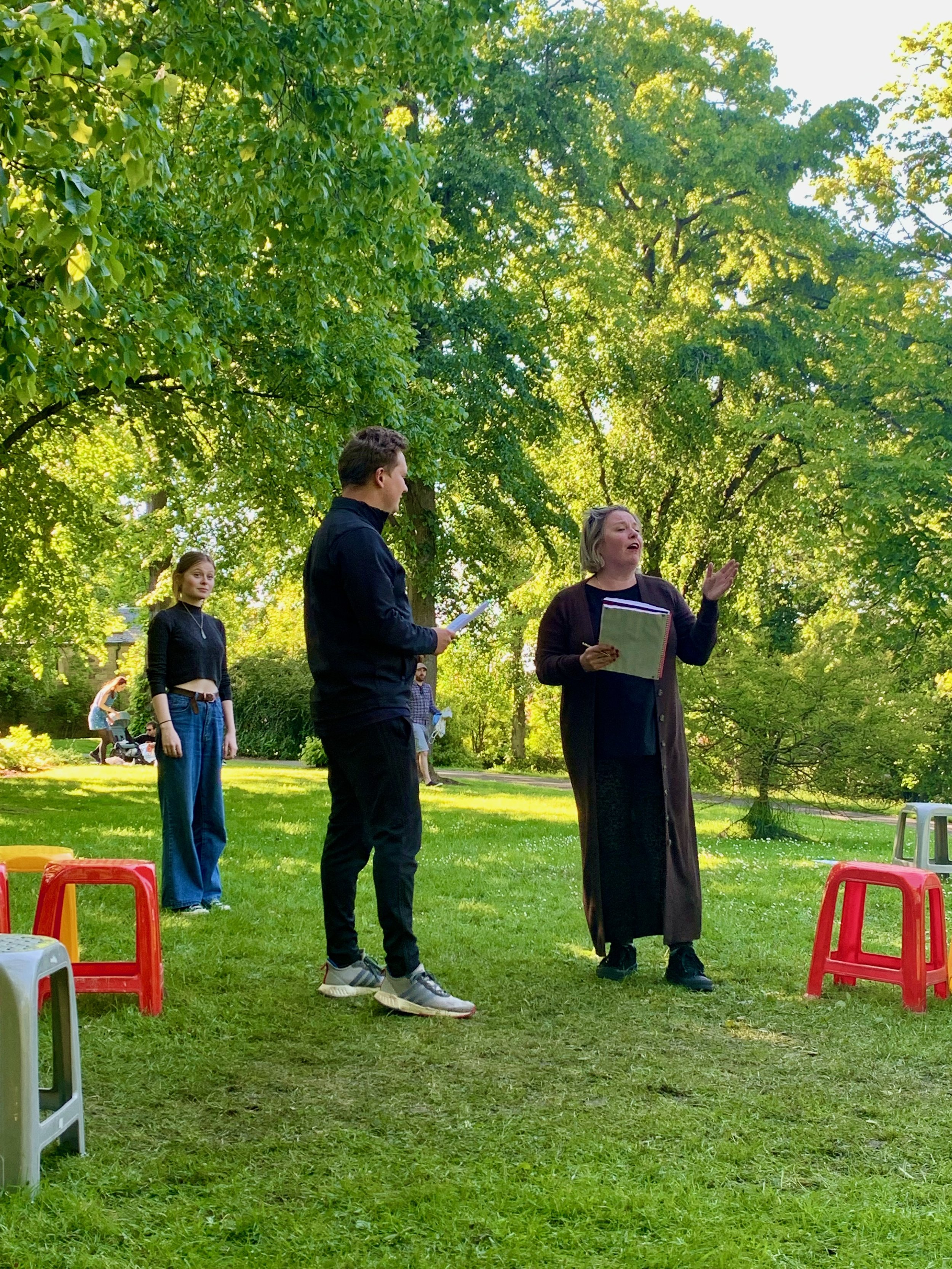What We Have Been / What We May Be
Interview with Associate Artist, Kirk Bage, Kirk is one of the company's core ensemble of actors and has worked with Bard in the Botanics since our first year. Most recently he played Iago in Othello and Mark Antony in Julius Caesar.
1. When, where and what was your first encounter with Bard in the Botanics?
I auditioned for Gordon Barr for an Autumn production of The Duchess of Malfi, set in the graveyard of the Ramshorn Church, Glasgow in 2002. I believe it may have been part of the West End Festival, but I can’t be 100% on that 12 years on! (Editors Note: It was part of The Merchant City Festival in September - lovely cold weather for an outdoor performance!) The company was then exclusively known as Glasgow Repertory Company and I remember being very impressed by everyone involved, how passionate they were about the work, and how quickly they could produce a work of such merit. I was desperate to be part of the main Summer season and was thrilled be asked to take part the following year, with roles in Measure For Measure and Antony & Cleopatra, as well as a now semi-legendary French Soldier in Scott Palmer’s Henry V.
2. Who would you describe as an unsung hero of Bard in the Botanics?
Without a doubt, much praise is due to every member of the stage management over the years, achieving miracles, keeping us safe, dealing with tantrums, working the longest hours and generally being the most fun in the pub afterwards – but that’s going to be a popular answer. Above all I think the unsung heroes of Bard in the Botanics are the paying public who have stayed faithful and returned year after year, despite many wet spells, to support the shows with great enthusiasm and knowledge. It’s always nice to meet a patron who can rattle a list of their favourite Bard in the Botanics productions.
3. Which individual performance by an actor has made a particularly lasting impression on you (it might be one that you saw, worked with or was in a production you were involved with)?
So many to choose from, but I have to go with the award winning performance of Stephen Clyde in A Midsummer Night’s Dream a few years ago. I went back to see the show 3 times and was blown away by the ideas and timing involved in that performance, which I think is the funniest thing I have ever seen on a stage that wasn’t a stand-up comedian! I would have felt self conscious laughing so hard if it hadn’t been for everyone else in the audience doing the same. A true poke in the eye for anyone who thinks Shakespeare has to be dry and serious. Borderline genius.
4. Of your own work, what is the most fulfilling production you’ve been a part of?
They have all been rewarding, and educational, in their own way, every one of them. Scott Palmer’s Richard III in 2004 will always remain special to me as it was probably the first time I truly understood every word and moment in a Shakespeare play. The amazing ensemble were brave in tackling the humour head on and I felt incredibly supported and privileged to be playing the iconic lead at such a young age. It paved the way to all future work I’ve done with the company and prepared me for all the future challenges I would face. Gordon Barr’s As You Like It from 2012 also sticks out for different reasons, as I could have played the character of Jacques all day every day (I still use the incredible All The World’s a Stage speech in a lot of auditions) and I think we painted some beautiful pictures in that play. As an all round experience though, I would have to say last season’s production of Julius Caesar, adapted and directed by Jennifer Dick; a small, super smart, super talented, hard working cast, many many challenges to bring the script to life, the challenge of the extremely hot and humid, but beautiful Kibble Palace and an audience feedback that surpasses anything else I’ve ever felt as an actor. Very special.
5. Which Bard in the Botanics production or performance did you miss that you wish you’d seen?
Everything from 2007 to 2009 really. Macbeth with Paul Cunningham, Taming of the Shrew with Jennifer Dick, etc, etc. There’ll always be part of me that regrets missing that phase of the company’s history. I also regret I could only watch Hamlet in 2011 once – I was performing simultaneously in Pericles in the Kibble Palace, but could have watched Paul Cunningham and Nicole Cooper in that production many many times.
6. Which costume (of yours or someone else’s) would you most like to have worn or is simply your favourite?
I’ve had some good ones, and also some shockers! I never particularly think I wear costumes well, so it’s not something I dwell on, but Jacques’ togs were very comfortable and like a second skin, so I’d say that of my own. But really it has to be any of the gorgeous dresses worn by the ladies in any number of shows, the sisters in King Lear and Nicole Cooper as Ophelia in Hamlet, and again in last year’s Othello, together with Jennifer Dick’s two costumes in the same play, stick most in my mind.
7. What is your favourite spot in the Botanics Gardens, known or unknown?
Outside the White House. Waiting outside there in all weathers, cloud watching, in all moods, before shows, after shows, nervous, elated, deflated, worried, proud, expectant – that spot is Bard in the Botanics for me! The plants and stuff are ok too.
8. Bard in the Botanics has staged 24 of Shakespeare’s plays. Which of the titles we haven’t yet produced are you most excited about being staged?
Richard II. A sublime play. I can’t wait...














